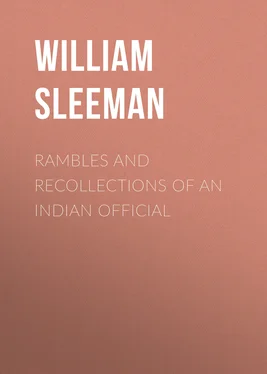William Sleeman - Rambles and Recollections of an Indian Official
Здесь есть возможность читать онлайн «William Sleeman - Rambles and Recollections of an Indian Official» — ознакомительный отрывок электронной книги совершенно бесплатно, а после прочтения отрывка купить полную версию. В некоторых случаях можно слушать аудио, скачать через торрент в формате fb2 и присутствует краткое содержание. Жанр: Путешествия и география, История, foreign_edu, foreign_antique, foreign_prose, на английском языке. Описание произведения, (предисловие) а так же отзывы посетителей доступны на портале библиотеки ЛибКат.
- Название:Rambles and Recollections of an Indian Official
- Автор:
- Жанр:
- Год:неизвестен
- ISBN:нет данных
- Рейтинг книги:4 / 5. Голосов: 1
-
Избранное:Добавить в избранное
- Отзывы:
-
Ваша оценка:
- 80
- 1
- 2
- 3
- 4
- 5
Rambles and Recollections of an Indian Official: краткое содержание, описание и аннотация
Предлагаем к чтению аннотацию, описание, краткое содержание или предисловие (зависит от того, что написал сам автор книги «Rambles and Recollections of an Indian Official»). Если вы не нашли необходимую информацию о книге — напишите в комментариях, мы постараемся отыскать её.
Rambles and Recollections of an Indian Official — читать онлайн ознакомительный отрывок
Ниже представлен текст книги, разбитый по страницам. Система сохранения места последней прочитанной страницы, позволяет с удобством читать онлайн бесплатно книгу «Rambles and Recollections of an Indian Official», без необходимости каждый раз заново искать на чём Вы остановились. Поставьте закладку, и сможете в любой момент перейти на страницу, на которой закончили чтение.
Интервал:
Закладка:
'True,' exclaimed Salāmat Alī, 'too true! we have ruined each other; we have cut each other's throats; we have lost the empire, and we deserve to lose it. You won it, and you preserved it by your union —ten men with one heart are equal to a hundred men with different hearts. A Hindoo may feel himself authorized to take in a Musalmān, and might even think it meritorious to do so; but he would never think it meritorious to take in one of his own religion. There are no less than seventy- two sects of Muhammadans; and every one of these sects would not only take in the followers of every other religion on earth, but every member of every one of the other seventy-one sects; and the nearer that sect is to its own, the greater the merit in taking in its members.' 102 102 Mīr Salāmat Alī is a stanch Sunnī, the sect of Osmān; and they are always at daggers drawn with the Shīas, or the sect of Alī. He alludes to the Shīas when he says that one of the seventy-two sects is always ready to take in the whole of the other seventy-one. Muhammad, according to the traditions, was one day heard to say, 'The time will come when my followers will he divided into seventy-three sects; all of them will assuredly go to hell save one.' Every one of the seventy-three sects believes itself to be the one happily excepted by their prophet, and predestined to paradise. I am sometimes disposed to think Muhammad was self-deluded, however difficult it might be to account for so much 'method in his madness'. It is difficult to conceive a man placed in such circumstances with more amiable dispositions or with juster views of the rights and duties of men in all their relations with each other, than are exhibited by him on almost all occasions, save where the question of faith in his divine mission was concerned. A very interesting and useful book might be made out of the history of those men, more or less mad, by whom multitudes of mankind have been led and perhaps governed; and a philosophical analysis of the points on which they were really mad and really sane, would show many of them to have been fit subjects for a madhouse during the whole career of their glory. [W. H. S.] For an account of Muhammadan sects, see section viii of the Preliminary Dissertation in Sale's Korān, entitled, 'Of the Principal Sects among the Muhammadans; and of those who have pretended to Prophecy among the Arabs, in or since the Time of Muhammad'; and T. P. Hughes, Dictionary of Islam (1885). The chief sects of the Sunnīs, or Traditionists, are four in number. 'The principal sects of the Shīas are five, which are subdivided into an almost innumerable number.' The court of the kings of Oudh was Shīa. In most parts of India the Sunnī faith prevails. The relation between genius and insanity is well expressed by Dryden ( Absalom and Achitopfel ): Great wits are sure to madness near allied, And thin partitions do their bounds divide. The treatise of Professor Cesare Lombroso, entitled The Man of Genius (London edition, 1891), is devoted to proof and illustration of the proposition that genius is 'a special morbid condition'. He deals briefly with the case of Muhammad at pages 31, 39, and 325, maintaining that the prophet, like Saint Paul, Julius Caesar, and many other men of genius, was subject to epileptic fits. The Professor's book seems to be exactly what Sir W. H. Sleeman desired to see.
'Something has happened of late to annoy you, I fear, Mīr Sāhib?'
'Something happens to annoy us every day, sir, where we are more than one sect of us together; and wherever you find Musalmāns you will find them divided into sects.'
It is not, perhaps, known to many of my countrymen in India that in every city and town in the country the right of sweeping the houses and streets is one of the most intolerable of monopolies, supported entirely by the pride of caste among the scavengers, who are all of the lowest class. The right of sweeping within a certain range is recognized by the caste to belong to a certain member; and, if any other member presumes to sweep within that range, he is excommunicated—no other member will smoke out of his pipe, or drink out of his jug; and he can get restored to caste only by a feast to the whole body of sweepers. If any housekeeper within a particular circle happens to offend the sweeper of that range, none of his filth will be removed till he pacifies him, because no other sweeper will dare to touch it; and the people of a town are often more tyrannized over by these people than by any other. 103 103 In the author's time, when municipal conservancy and sanitation were almost unknown in India, the tyranny of the sweepers' guild was chiefly felt as a private inconvenience. It is now one of the principal of the many difficulties, little understood in Europe, which bar the progress of Indian sanitary reform. The sweepers cannot be readily coerced because no Hindoo or Musalmān would do their work to save his life, nor will he pollute himself even by beating the refractory scavenger. A strike of sweepers on the occasion of a great fair, or of a cholera epidemic, is a most dangerous calamity. The vested rights described in the text are so fully recognized in practice that they are frequently the subject of sale or mortgage.
It is worthy of remark that in India the spirit of combination is always in the inverse ratio to the rank of the class; weakest in the highest, and strongest in the lowest class. All infringements upon the rules of the class are punished by fines. Every fine furnishes a feast at which every member sits and enjoys himself. Payment is enforced by excommunication—no one of the caste will eat, drink, or smoke with the convicted till the fine is paid; and, as every one shares in the fine, every one does his best to enforce payment. The fines are imposed by the elders, who know the circumstances of the culprit, and fix the amount accordingly. Washermen will often at a large station combine to prevent the washermen of one gentleman from washing the clothes of the servants of any other gentleman, or the servants of one gentleman from getting their clothes washed by any other person than their own master's washerman. This enables them sometimes to raise the rate of washing to double the fair or ordinary rate; and at such places the washermen are always drunk with one continued routine of feasts from the fines levied. 104 104 The low-caste Hindoos are generally fond of drink, when they can get it, but seldom commit crime under its influence.
The cost of these fees falls ultimately upon the poor servants or their masters. This combination, however, is not always for bad or selfish purposes. I was once on the staff of an officer commanding a brigade on service, whose elephant driver exercised an influence over him that was often mischievous and sometimes dangerous; 105 105 An elephant driver, by reason of his position on the animal, has opportunities for private conversation with his master.
for in marching and choosing his ground, this man was more often consulted than the quarter-master-general. His bearing was most insolent, and became intolerable, as well to the European gentlemen as to the people of his caste. 106 106 Elephant drivers (mahouts ) are Muhammadans, who should have no caste, but Indian Musalmāns have become Hinduized, and fallen under the dominion of caste.
He at last committed himself by saying that he would spit in the face of another gentleman's elephant driver with whom he was disputing. All the elephant drivers in our large camp were immediately assembled, and it was determined in council to refer the matter to the decision of the Rājā of Darbhanga's driver, who was acknowledged the head of the class. We were all breakfasting with the brigadier after muster when the reply came-the distance to Darbhanga from Nāthpur on the Kūsī river, where we then were, must have been a hundred and fifty miles. 107 107 Darbhanga is in Tirhūt, seventy miles NE. of Dinapore. The Kūsī (Kōsī or Koosee) river rises in the mountains of Nepāl, and falls into the Ganges after a course of about 325 miles. Nāthpur, in the Puraniya (Purneah) District, is a mart for the trade with Nepal.
We saw men running in all directions through the camp, without knowing why, till at last one came and summoned the brigadier's driver. With a face of terror he came and implored the protection of the brigadier; who got angry, and fumed a good deal, but seeing no expression of sympathy on the faces of his officers, he told the man to go and hear his sentence. He was escorted to a circle formed by all the drivers in camp, who were seated on the grass. The offender was taken into the middle of the circle and commanded to stand on one leg 108 108 The customary attitude of a suppliant.
while the Raja's driver's letter was read. He did so, and the letter directed him to apologize to the offended party, pay a heavy fine for a feast, and pledge himself to the offended drivers never to offend again. All the officers in camp were delighted, and some, who went to hear the sentence explained, declared that in no court in the world could the thing have been done with more solemnity and effect. The man's character was quite altered by it, and he became the most docile of drivers. On the same principle here stated of enlisting the community in the punishment of offenders, the New Zealanders, and other savage tribes who have been fond of human flesh, have generally been found to confine the feast to the body of those who were put to death for offences against the state or the individual. I and all the officers of my regiment were at one time in the habit of making every servant who required punishment or admonition to bring immediately, and give to the first religious mendicant we could pick up, the fine we thought just. All the religionists in the neighbourhood declared that justice had never been so well administered in any other regiment; no servant got any sympathy from them—they were all told that their masters were far too lenient.
Интервал:
Закладка:
Похожие книги на «Rambles and Recollections of an Indian Official»
Представляем Вашему вниманию похожие книги на «Rambles and Recollections of an Indian Official» списком для выбора. Мы отобрали схожую по названию и смыслу литературу в надежде предоставить читателям больше вариантов отыскать новые, интересные, ещё непрочитанные произведения.
Обсуждение, отзывы о книге «Rambles and Recollections of an Indian Official» и просто собственные мнения читателей. Оставьте ваши комментарии, напишите, что Вы думаете о произведении, его смысле или главных героях. Укажите что конкретно понравилось, а что нет, и почему Вы так считаете.












